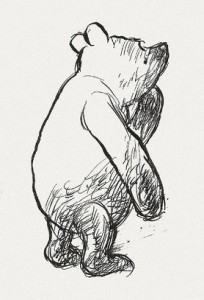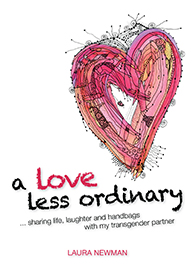 This is my 100th blog post. Not that it’s an achievement, only ‘OMG no-one’s going to read that any more’! But it has been therapeutic for me, helpful for some, and spoken for others, so I don’t think it’s a waste of time.
This is my 100th blog post. Not that it’s an achievement, only ‘OMG no-one’s going to read that any more’! But it has been therapeutic for me, helpful for some, and spoken for others, so I don’t think it’s a waste of time.
Anyhow, today’s reading is taken from the book of Pooh:
‘Hello, Rabbit,’ he [Pooh] said, ‘is that you?’
‘Let’s pretend it isn’t,’ said Rabbit, ‘and see what happens.’
How do you know when someone is pretending to be themselves?
In the privacy of your soul, there is something that no-one else can ever know. And it is you.
You think you can understand it, and if you can explain it, in words, an image, in music, by analogy, then another will know who you are, and understand.
They think they can understand it, because they are thinking, intelligent, empathic, and – like you – people with life experiences as parallels and comparisons.
And the most loving among us try so hard. But when it comes down to it, we fail. I don’t think I’m any better than anyone else at this. I just hope I am now learning that I can’t know another anything like they know themselves, and to respect that. And if I love them, to recognise what it is that I love.
I have tried so hard to explain what it means to be transgender. I’ve written poems and prose, made analogies and comparisons, intellectual arguments and philosophical positions. I’ve explained clinically, emotionally, psychologically, personally, objectively. And now I have to accept that this private part of my soul can never be understood or known. Even those with whom I have been most open, visible, vulnerable, for however long, will never really know.
And that is why I feel in my heart of hearts, that for most people, my transition will always be something I did, that I chose, that I elected to become – rather than something so innate that it has always been part of my being, my heart and soul. I no longer believe that I can say anything that could ever reach that level of knowing. If I could, maybe I would not lose the love I had; but I can’t. So I give up.
The importance of peripherals
It has to be of no consequence now what others think, or how they respond. I must simply live. And let go. It’s been ten months now, and those who don’t let go of me I shall be safe with. Those who do nothing as I do let go, aren’t good to hang onto. Those who think I have changed least are those closest to that private part of myself, those who think I have changed most are closest to my peripheral attributes.
And I also realise that I have to let go of those peripheral attributes too. One of these is ‘husband’. That’s easy, because it’s obvious and I never felt comfortable with the label: it presumed things that I didn’t want to be identified with in my love relationship. Another lies in things where I have led. I was a chair of governors for a school. I was lead trumpet in a band. I was a manager. I was active on many committees. I helped to lead a protest that took me all over the country and to Europe. Lots of things. Things I did naturally (and feel good about, to be honest), and that felt important at the time – in doing something worthwhile and being appreciated. I have very little of any of this left. It isn’t that I am nobody, just that the somebody I really am is here inside, in this privacy of the soul.
This week I have felt a bit battered by egos: people vying for position to be seen, heard, applauded, approved, included, better. All things I guess I have done too. And I have to let it all go, and say: sometimes it is enough just to be. Enough to be, even if there is no-one who loves you and to whom you are that really special person. (And there are so many trans people who lose their families.) I have to let go of what I was to others and dare to be alone, in the privacy of the soul. There, I have to learn, is enough security and resource, so long as I don’t compare myself with others. And enough to finally let go of everything I meant, to those who used to be closest to me.
I am nothing. I am everything.
For sure, I don’t ever want to find again that my peripherals are more loved than my essence. That sounds frightfully frightfully, doesn’t it? It just means that my sense of personhood matters far more than the clothes I wear or the profile of my body. Those things have to be congruent with my person, not the other way round. But I can never explain to you, if you have never known incongruence, that my peripherals do not define me, even if they are necessary for you to love me.
Giving up, letting go, walking away from people I never wanted to lose cannot be understood either. But I finally know I have to do it, and can, because I have come to accept that no-one else will ever understand what it is to be transsexual anyway. There is no more to say. I’m not walking away from love; I have withheld nothing. No, I’m walking away from only being accepted as something I am not.
The only way I can explain ‘blue’ to an unsighted person is by describing what it means to me. It matters not if I say the sky is blue, or give an electromagnetic frequency range. I can only say how blue is my favourite colour, it feels cool, or healing, or calm.
So as I walk away, as I let go, let me just say that knowing my gender is like ‘blue’ and I need to wear it. If you think you understand – if you want to – walk with me. You are most welcome.
 I turned up a scanned article someone helpfully sent me ages ago. It was about Helen Boyd and Betty in the early days. Great! There was Betty doing Helen’s make-up, and then Betty resting her head lovingly on Helen’s shoulder. This was a love less ordinary, surely?
I turned up a scanned article someone helpfully sent me ages ago. It was about Helen Boyd and Betty in the early days. Great! There was Betty doing Helen’s make-up, and then Betty resting her head lovingly on Helen’s shoulder. This was a love less ordinary, surely?